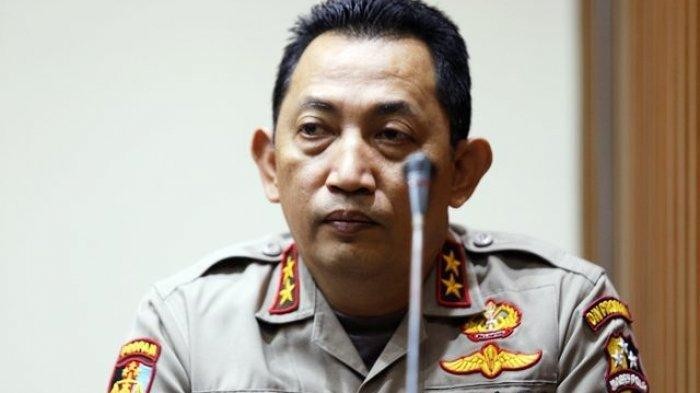Popular Reads
Top Results
Can't find what you're looking for?
View all search resultsPopular Reads
Top Results
Can't find what you're looking for?
View all search resultsPolice prescribe restorative justice in cyberlaw cases
Critics insist guidelines cannot replace law’s revision
Change text size
Gift Premium Articles
to Anyone
N
ational Police chief Gen. Listyo Sigit Prabowo has instructed personnel to use a restorative justice approach in enforcing the country’s notorious cyberlaw, following a presidential instruction to practice greater discretion in handling provisions that have been used to entrap critics.
The 2008 Electronic Information and Transactions (ITE) Law allows people to report others for possible defamation and hate speech online. It has been the subject of heated debate due its broad interpretation, which has led to a stifling of criticism and impunity by people in positions of power.
According to a circular issued this week, Listyo ordered police investigators to allow restorative justice to take precedence over the enforcement of the penal code, which he considered a “last resort” for resolving cases put forward under the cyberlaw. A police spokesperson said the instruction would also impact ongoing investigations.
The directive also notes, however, that the restorative justice approach would not apply to hate speech or discrimination against certain groups, races and religions that may incite public uproar.
The police chief also instructed so-called “virtual police” to use preemptive and preventive measures to educate the masses about the ethics and use of digital platforms, while investigators were asked to categorize cases before determining whether or not to proceed with the dossier.
In an interview with Tempo magazine on Monday, Listyo said that residual tensions from the aftermath of the bitterly contested presidential election in 2019, as well as that of the Jakarta gubernatorial election in 2017, had led to the increased use of the ITE Law.
According to data from the Southeast Asia Freedom of Expression Network (SAFEnet), there were 786 cases involving the law between 2016 and 2020, with nearly 90 percent of the people charged ending up in jail. Activists say the sweeping online censorship law has been used in many ways to silence government critics or opponents of people in power, whether the subject is legislation or exposing a sexual predator at the workplace.
Last year, figures linked to the Save Indonesia Coalition (KAMI) opposition group were detained over allegations of spreading hate speech and inciting violence over the Job Creation Law based on records of their social media conversations, sparking accusations of repression.
In 2019, a woman in Lombok, East Nusa Tenggara, was put behind bars for six months after sharing online what would otherwise be considered evidence of sexual harassment by her boss.
The police chief was hopeful that exercising discretion and deploying the virtual police would foster a more peaceful digital environment. “If there is hate speech on social media we will identify it and warn users [...] This is an educational approach to ensure people don’t communicate carelessly on social media,” Listyo said, as quoted by Tempo.
The circular was made public after Coordinating Political, Legal and Security Affairs Minister Mahfud MD announced on Monday the establishment of a team of officials to devise police guidelines for enforcing the cyberlaw and another team to assess whether the law needs revising. Mahfud said the study could take up to three months.
The move has cast doubt on the government’s intentions to revise the cyberlaw, particularly after President Joko “Jokowi” Widodo sent a strong message on Feb. 15 saying the law itself was “the source” of the problem and that it could be revised to remove “vague provisions”.
The circular itself has elicited a spectrum of responses from activists and legal experts who believe it still allows too much space for misinterpretation and lacks clear steps for authorities to process cases in a fair manner.
Institute of Security and Strategic Studies (ISESS) researcher Bambang Rukminto bemoaned the fact that the directive did not offer detailed definitions of what constitutes an act of online critique, hate speech or hoax, which he said was crucial in order to “avoid different interpretations by the police and members of the public”.
Criminal law lecturer Miko Ginting of the Indonesia Jentera School of Law said the circular lacked direction, particularly considering that defamation cases could only be processed after a victim reported it.
“In terms of law enforcement, the circular could be firmer in its directive,” said Miko on Tuesday.
The police chief’s instruction also does not remove the need for the state to revise the ITE Law, activists said.
“The government needs to put its money where its mouth is,” said Amnesty International Indonesia executive director Usman Hamid on Wednesday.
“If it is really committed to ‘upholding the public’s sense of justice’ as Jokowi said, and be open to ‘harsh’ criticism, as [Cabinet Secretary] Pramono Anung said, then it must prove it not merely by paying lip service to the possibility of revising the ITE Law, but by taking concrete steps such as releasing those who have already been prosecuted simply for expressing their opinions peacefully,” he added.










